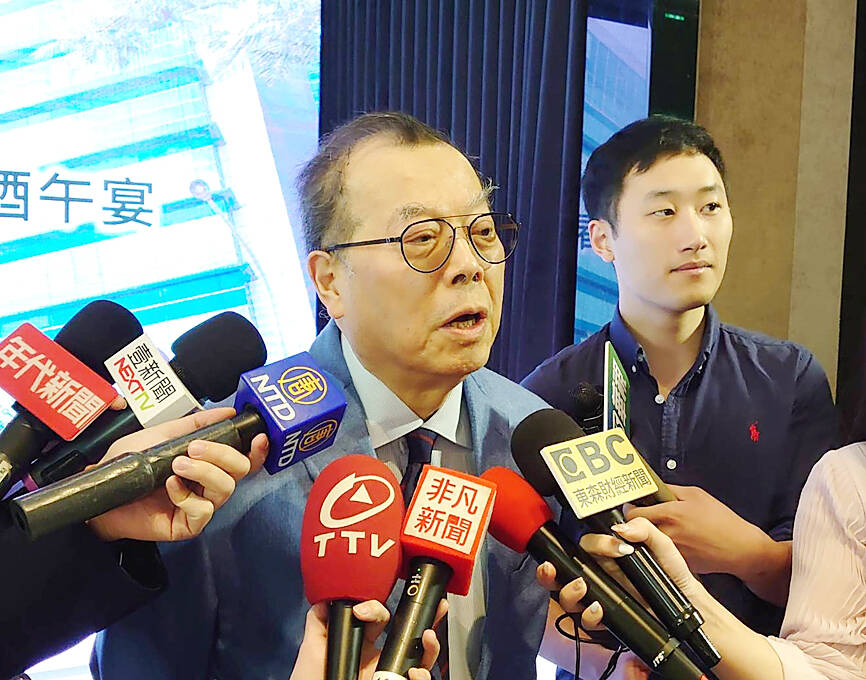Contract chipmaker Powerchip Semiconductor Manufacturing Corp (力積電) yesterday gave an upbeat outlook for the second half of this year on the back customers’ eagerness to transfer orders from Chinese chipmakers in response to US chip restrictions.
Revenue from the new orders would become noticeable in July or August, and be even greater next year, the company projected.
“Many customers approached us after US-China trade frictions escalated,” Powerchip president Brian Shieh (謝再居) told a news conference. “We believe this should be a good business.”

Photo: CNA
The positive outlook also reflects a pickup in chip demand as businesses reopen after the long Lunar New Year holiday, Shieh said.
This year is a “transformation year” for Powerchip as the company aims to optimize its product portfolios, he said.
The company aims to reduce its exposure to lower-margin driver ICs used in flat panels and sensors amid cutthroat price competition with Chinese chipmakers, he said.
Revenue from driver ICs and sensors are expected to account for 15 percent of the company’s total revenue this year, halved from 30 percent last year, Powerchip said.
Power management chips would become the largest revenue contributor this year, it said.
Powerchip is making inroads into interposer technology, which is used in advanced packaging services, due to robust demand for artificial intelligence chips, the company said.
The chipmaker plans to double its interposer capacity to about 4,000 units next year from 2,000 units this year, it said.
Powerchip plans to have NT$30 billion to NT$34 billion (US$951.5 million to US$1.1 billion) in capital expenditures this year, including funding for capacity expansion at its new 12-inch fab in Miaoli County’s Tongluo Science Park (銅鑼科學園區). It spent NT$48 billion last year.
Regarding its newly announced partnership with India’s Tata Electronics Pvt Ltd, Powerchip chairman Frank Huang (黃崇仁) said the company did not seek to invest in or operate the South Asian nation’s first 12-inch fab in Dholera, Gujarat.
Instead, the company would assist Tata Electronics to build the fab and collect license fees in the future, he said.
Tata Electronics is set to hold a ceremony on Tuesday next week to launch the construction of the fab, he added.

Intel Corp chief executive officer Lip-Bu Tan (陳立武) is expected to meet with Taiwanese suppliers next month in conjunction with the opening of the Computex Taipei trade show, supply chain sources said on Monday. The visit, the first for Tan to Taiwan since assuming his new post last month, would be aimed at enhancing Intel’s ties with suppliers in Taiwan as he attempts to help turn around the struggling US chipmaker, the sources said. Tan is to hold a banquet to celebrate Intel’s 40-year presence in Taiwan before Computex opens on May 20 and invite dozens of Taiwanese suppliers to exchange views

Application-specific integrated circuit designer Faraday Technology Corp (智原) yesterday said that although revenue this quarter would decline 30 percent from last quarter, it retained its full-year forecast of revenue growth of 100 percent. The company attributed the quarterly drop to a slowdown in customers’ production of chips using Faraday’s advanced packaging technology. The company is still confident about its revenue growth this year, given its strong “design-win” — or the projects it won to help customers design their chips, Faraday president Steve Wang (王國雍) told an online earnings conference. “The design-win this year is better than we expected. We believe we will win

Chizuko Kimura has become the first female sushi chef in the world to win a Michelin star, fulfilling a promise she made to her dying husband to continue his legacy. The 54-year-old Japanese chef regained the Michelin star her late husband, Shunei Kimura, won three years ago for their Sushi Shunei restaurant in Paris. For Shunei Kimura, the star was a dream come true. However, the joy was short-lived. He died from cancer just three months later in June 2022. He was 65. The following year, the restaurant in the heart of Montmartre lost its star rating. Chizuko Kimura insisted that the new star is still down

While China’s leaders use their economic and political might to fight US President Donald Trump’s trade war “to the end,” its army of social media soldiers are embarking on a more humorous campaign online. Trump’s tariff blitz has seen Washington and Beijing impose eye-watering duties on imports from the other, fanning a standoff between the economic superpowers that has sparked global recession fears and sent markets into a tailspin. Trump says his policy is a response to years of being “ripped off” by other countries and aims to bring manufacturing to the US, forcing companies to employ US workers. However, China’s online warriors